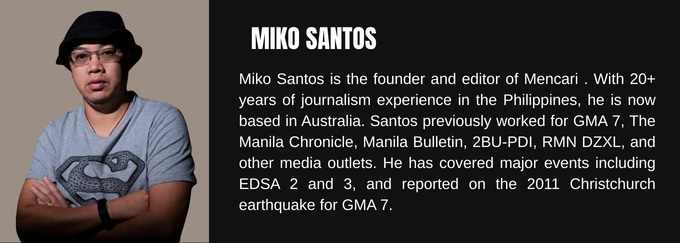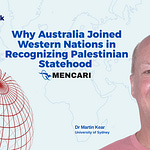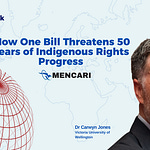This episode examines the concerning rise of far-right extremist groups in Australia, focusing on the August 31st "March for Australia" protests that drew thousands across major cities. Dr. Simon Copland, an expert in online extremism from Australian National University, explains how groups like sovereign citizens—people who believe governments are illegitimate—have grown significantly since the COVID-19 pandemic.
The conversation reveals how these movements use social media to spread anger and false information, particularly targeting immigrants as scapegoats for Australia's housing and cost-of-living crises. Despite organizers claiming otherwise, neo-Nazi groups actively participated in and spoke at these rallies, showing the interconnected nature of Australia's extremist ecosystem.
While the numbers weren't as large as feared, the movements are becoming more emboldened and violent, posing real security threats. The episode also explores the disturbing connections between anti-immigration sentiment and misogynistic beliefs, particularly through movements like "Tradwives" that promote both traditional gender roles and white supremacist ideologies.
Truth matters. Quality journalism costs.
Your subscription to Mencari directly funds the investigative reporting our democracy needs. For less than a coffee per week, you enable our journalists to uncover stories that powerful interests would rather keep hidden. No corporate influence. No compromises. Just honest journalism when we need it most.
Five Key Takeaways
COVID-19 Catalyst: The sovereign citizen movement experienced significant growth in Australia following pandemic lockdowns and vaccine mandates, as people felt direct government intervention in their lives for the first time
Social Media Manipulation: Far-right groups excel at using digital platforms to spread disinformation and create anger, exploiting social media algorithms that prioritize engagement over accuracy
Scapegoating Strategy: Despite evidence that immigrants contribute positively to Australia's economy, extremist groups falsely blame them for housing shortages and economic problems to divert attention from real causes like corporate profiteering
Neo-Nazi Integration: Despite organizers' denials, neo-Nazi leaders like Thomas Sewell actively spoke at March for Australia events, revealing coordination within Australia's far-right ecosystem
Violence Escalation: While protest numbers were lower than expected, extremist groups are becoming increasingly emboldened and willing to engage in violence, presenting genuine security threats
Detailed Synopsis
This episode of PART 8A provides crucial insights into Australia's evolving far-right landscape through an in-depth conversation with Dr. Simon Copland, a leading researcher in online extremism at Australian National University. The discussion centers on the August 31st "March for Australia" protests, which drew an estimated 15,000 people in Adelaide alone, making it one of the largest far-right demonstrations in recent Australian history.
Dr. Copland begins by explaining the sovereign citizen movement—a pseudo-legal ideology originating in the 1970s that views governments as illegitimate unless individuals personally consent to their authority. This movement has found fertile ground in Australia since 2022, particularly following the COVID-19 pandemic's lockdown measures and vaccine mandates. For many Australians, these policies represented the first significant government intervention in their daily lives, creating resentment that extremist groups successfully exploited.
The conversation reveals the sophisticated digital strategies employed by these movements. Dr. Copland explains how far-right groups leverage social media algorithms designed to maximize engagement, often through content that generates anger and outrage. This creates a feedback loop where false information about immigration, housing, and social issues spreads rapidly, reaching vulnerable individuals during times of economic distress.
A significant portion of the discussion focuses on the deliberate scapegoating of immigrants for Australia's housing and cost-of-living crises. Dr.Copland provides specific examples, including how one March for Australia organizer was connected to a major property developer holding thousands of empty properties—highlighting how those truly responsible for housing shortages deflect blame onto vulnerable communities.
The episode explores the troubling intersection of misogyny and racism within these movements, examining phenomena like the "Tradwives" movement in the United States. This reveals how anti-immigration sentiment often connects to broader ideologies promoting traditional gender roles and white supremacy, creating a comprehensive worldview that appeals to various grievances.
Despite organizers' claims of excluding extremist groups, the interview exposes clear evidence of neo-Nazi participation and leadership in these events. Thomas Sewell, leader of the National Socialist Network, not only attended but spoke at Melbourne's rally, demonstrating the porous boundaries between different extremist factions.
Dr. Copland provides crucial context by comparing Australia's situation to international trends, noting that while far-right movements haven't achieved the political success seen in the United States or Europe, concerning indicators are emerging. These include increased support for fringe parties, growing negative sentiment toward immigration in polling, and most alarmingly, increased willingness among extremist groups to engage in violence.
The episode concludes with practical guidance for monitoring these movements' evolution, emphasizing the need for continued vigilance from researchers, journalists, and policymakers to prevent Australia from following the path of radicalization seen in other Western democracies.
What Readers Will Learn
Historical Context: Understanding of how the sovereign citizen movement developed and why it resonates in common law countries like Australia
COVID-19 Impact: How pandemic policies inadvertently accelerated extremist recruitment by creating widespread resentment toward government authority
Digital Manipulation Tactics: Specific strategies used by far-right groups to exploit social media algorithms and spread disinformation effectively
Economic Scapegoating: How extremist leaders deliberately redirect anger about legitimate economic problems toward vulnerable minority groups
Ideological Intersections: The connections between anti-immigration sentiment, misogyny, and white supremacist beliefs within modern extremist movements
International Comparisons: How Australia's far-right landscape compares to more advanced extremist movements in the US and Europe
Warning Signs: Key indicators that researchers and policymakers should monitor to assess whether extremist movements are gaining mainstream traction
Security Implications: Why even small numbers of radicalized individuals pose significant threats to community safety
This is not a sponsored video/audio. A small commission will be paid to us if you purchase anything through some of the affiliate links in our product listings.
If you want to chat more about this topic, I would love to continue this conversation with you, over Twitter @realmikosantos!
This podcast is powered by Kangaroofern, Australia's Independent Podcast Management Company.
Thanks so much for listening to our podcast!
If you enjoyed this episode, be sure to subscribe so you'll be notified when a new episode is posted in the Apple podcast, Google podcast, Spotify, Stitcher or via RSS.
If you think others could benefit from listening, please share it on your socials.
You can also subscribe to the podcast app on your mobile device.
If you found value in this episode, leave us an Apple Podcast review. Ratings and reviews from our listeners are extremely valuable to us and greatly appreciated. They help our podcast rank higher on Apple Podcasts and expose our show to more awesome listeners like you.
This is a premium episode. If you would like to discuss this with other subscribers or get access to the episodes, visit Readmencari.com
Got a News Tip?
Contact our editor via Proton Mail encrypted, X Direct Message, LinkedIn, or email. You can securely message him on Signal by using his username, Miko Santos.
While mainstream media serves corporate interests, you deserve the truth.
Your Mencari subscription—less than a coffee per week—powers real independent journalism. Our reporters dig into the stories powerful people desperately want buried. No corporate masters. No political handlers. Just the uncomfortable truths that matter most right now.
This is journalism without compromise, funded directly by readers who refuse to be misled. If this reporting opened your eyes, hit Restack so others can see what they're missing.
Not ready to be paid subscribe, but appreciate the newsletter ? Grab us a beer or snag the exclusive ad spot at the top of next week's newsletter.















